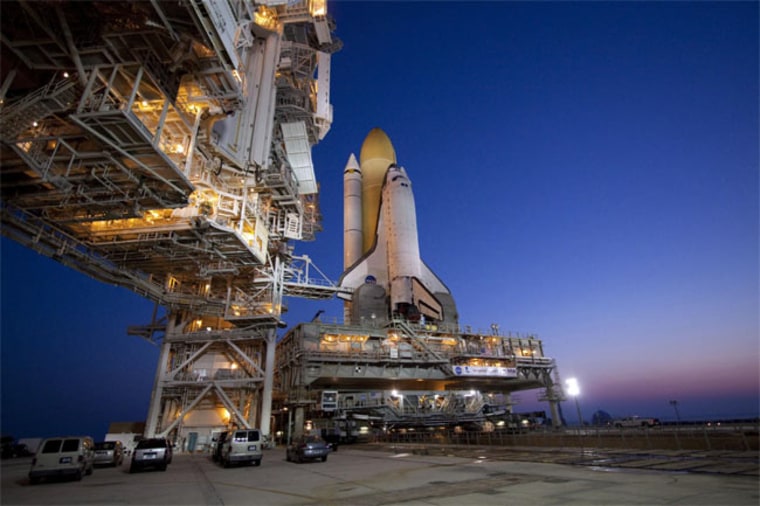NASA is counting down toward the last launch of the space shuttle Atlantis.
The clock started Tuesday at T-minus-43 hours at 4 p.m. ET. The countdown will take some breaks over the next few days for built-in holds in the schedule. Atlantis is slated to lift off for its 32nd and final mission Friday at 2:20 p.m. ET from Launch Pad 39A at Kennedy Space Center in Florida.
On its last scheduled space trip, the shuttle will carry six astronauts, a new Russian research room, and a set of spare supplies to the International Space Station.
"Everything is going quite well at Pad A," NASA test director Steve Payne said during a Tuesday briefing. "Work continues on schedule as we prepare Atlantis for her 32nd flight."
The weather outlook is promising for a Friday afternoon blastoff, shuttle weather officer Kathy Winters said. "Overall, weather looks favorable," she said. "There's just a 30 percent chance of KSC weather prohibiting launch, mainly for concern over a low cloud ceiling."
If the launch does happen to be delayed for any reason, NASA can try again to loft the shuttle through May 18. After that the shuttle must stand down temporarily to let an unmanned Delta 4 rocket carry a GPS satellite to orbit.
The weather forecast is similar for Saturday and Sunday, with a 70 percent chance of good conditions expected as on Friday.
Mission managers said this last mission of Atlantis — the first of the final three shuttle flights ever before the fleet is retired later this year — will be especially meaningful for them.
Slideshow 12 photos
Month in Space: January 2014
"It is one of those moments where people do kind of contemplate on what we've been doing for the last few years," Payne said. "We're making a point of savoring the moment while we can, because this has really been a privilege for us to work out here and be associated with this program."
Atlantis, led by commander Ken Ham, is scheduled to spend 12 days in space. Its main payload is the Russian Mini-Research Module 1, also called "Rassvet" (which means "Dawn" in Russian).
"The MRM-1 is installed on the payload bay," said Robby Ashley, STS-132 payload manager. "It'll be joining MRM No. 2, which is already on orbit."
Also packed in Atlantis' payload bay is a set of six replacement batteries that will be swapped out with aging ones currently on the station.
"These batteries have a six-and-a-half-year design life, and they've been up there a lot longer than that," Ashley said.
Atlantis also will deliver a new space-to-ground antenna that will serve as an active backup antenna to one currently in use.

